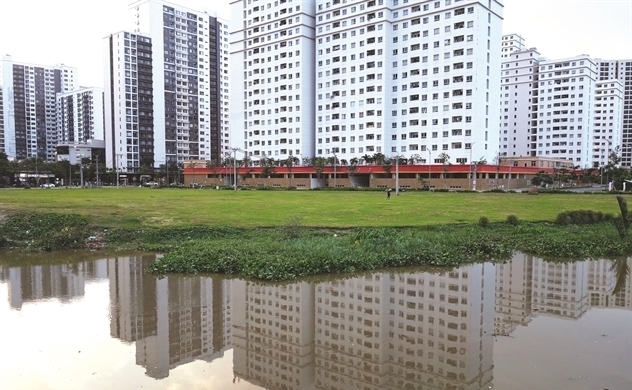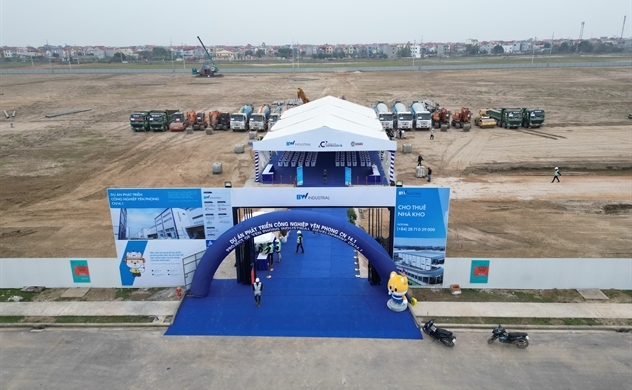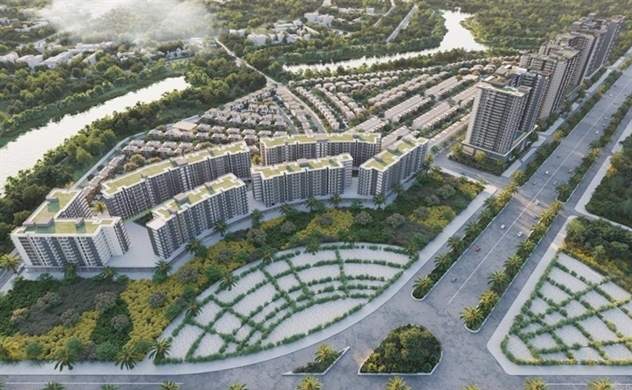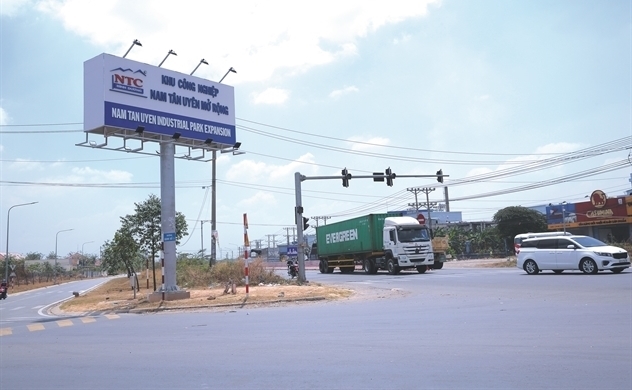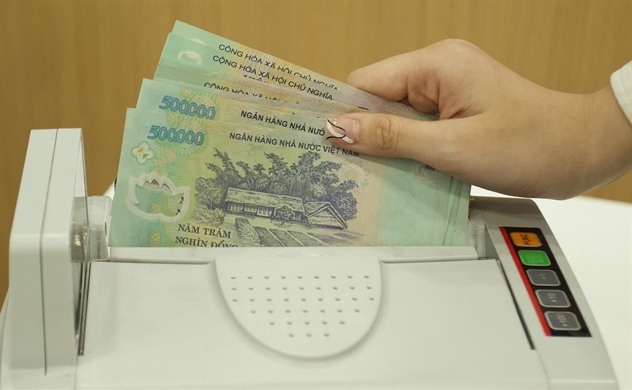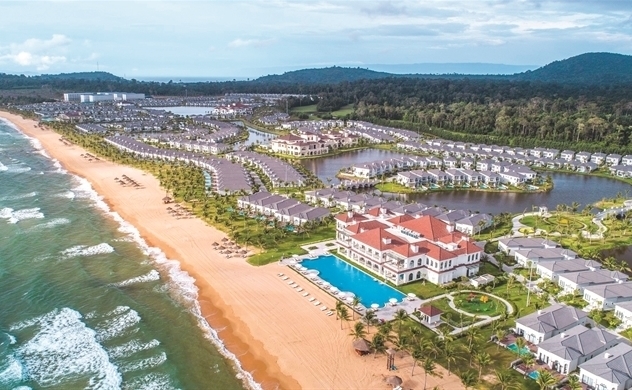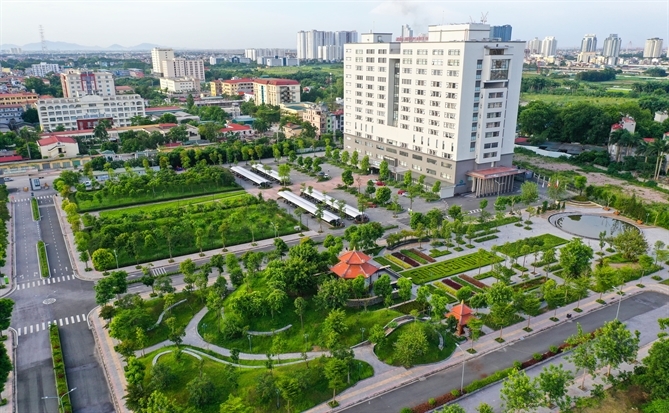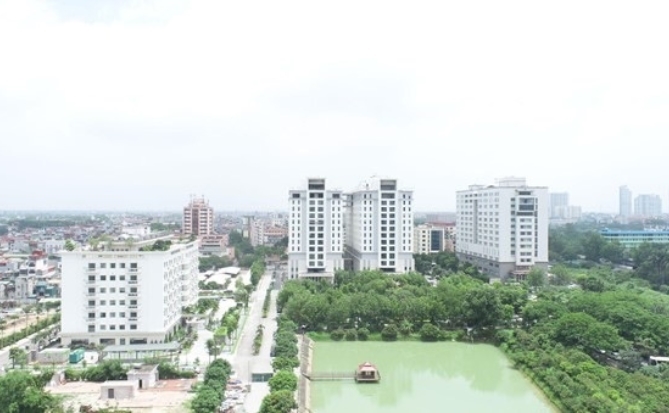Complicated procedures put foreigners off Vietnam housing market

A foreigner views a real estate project in Vietnam. Photo by Vu Pham.
Even when the market was bustling in the 2016-2019 period, foreigners only bought high-end luxury apartments, said property expert Nguyen Hoang.
Huge demand
Since the 2014 Housing Law took effect on July 1, 2015, foreigners with legal entry could buy and own apartments in commercial housing projects for a maximum period of 50 years, which could be extended if needed, except in defense and security protection areas.
Foreign organizations and individuals cannot own more than 30% of the total number of apartments in an apartment building, and no more than 10% of a housing project of less than 2,500 units.
The Ho Chi Minh City Real Estate Association's (HoREA) survey of 17 large real estate enterprises showed that 12,335 foreigners bought apartments in Vietnam, with 10,020 or 81.2% in Ho Chi Minh City.
The majority of foreign home buyers came from South Korea, mainland China, Taiwan, Hong Kong, and Singapore. Those from Europe, North America, Australia, New Zealand, and Japan tend to rent houses.
Data from the Overseas Vietnamese Entrepreneurs Association indicated that there are about 5.5 million Vietnamese living abroad and more than 1 million second and third-generation Vietnamese of foreign nationalities with parents or grandparents originating from Vietnam. Of whom, about 600,000-700,000 people are businessmen and highly qualified intellectuals. Many want to return to their homeland to invest, do business, or live, so the demand for housing in Vietnam is huge.
Despite the great demand, legal issues are a big obstacle making it difficult for foreigners to buy real estate in Vietnam.
“Besides difficulties in obtaining an ownership certificate, the law does not allow foreigners to buy houses attached to land,” Hoang said.
There are no regulations permitting foreigners to buy condotels and officetels, he said, adding foreigners who have bought fixed-term apartments face difficulties transferring them due to complicated procedures.
Therefore, the expert proposed that foreigners should be allowed to buy condotels and officetels, besides apartments. At the same time, it is necessary to have more clear regulations on procedures for property ownership and transfer.
At the June session of the National Assembly, the highest legislative body of Vietnam, Construction Minister Nguyen Thanh Nghi said Vietnam’s Law on Housing 2014 allows foreign organizations and individuals to buy and own houses in Vietnam, which the current draft amendments to the law are based on.
The minister added that statistics showed that since the 2014 Law on Housing took effect, the amount of houses bought and owned by foreigners in Vietnam had not risen significantly. In addition, both the current law and now the draft amendments have strict regulations on the types of properties foreigners are allowed to purchase, their locations as well as the number of properties.
Obstacles linger
According to the HoREA, the policy for foreigners to own homes confirms that Vietnam has opened its door and its legal system like other countries around the world. Besides attracting FDI, this is also a form of "on-the-spot export" to stimulate consumer demand and meet the diverse needs of foreigners.
In fact, there has been no "wave" of foreigners buying houses in Vietnam in the past five years, and there are also no signs of a negative impact on middle- and low-income people, it said.
However, some countries like South Korea and Australia have tightened conditions for foreigners to buy and own properties to prevent speculation or high prices as a result of foreigners buying too many houses, making it difficult for middle- and low-income indigenous people to own a home.
Vietnam also faces some problems regarding foreign home buyers. The 2014 Housing Law was issued after the 2013 Land Law, which included Article 5 that stipulates "land users" but does not mention land users who are "foreign individuals".
The Land Law allows individuals to use their land use rights and assets attached to land as collateral at credit institutions licensed to operate in Vietnam, but not at overseas banks. Meanwhile, overseas Vietnamese and foreign individuals owning real estate in Vietnam have a need to mortgage houses attached to land use rights at banks in Vietnam or abroad. According to international law, a real estate-related dispute will be settled under the law of the country where the property is based.
The HoREA held that the issuance of land use and house ownership right certificates (pink books) to foreigners remains slow, leaving home buyers frustrated as their legitimate rights and interests are not guaranteed.
Another problem is that there is no legal framework to address the needs of foreign home owners when transferring properties and in cases where commercial housing projects are completed and become normal residential areas. The Law on Housing stipulates that foreigners can only buy houses in commercial housing projects - meaning they are not allowed to buy a home in normal residential areas.
In addition, there is also no guidance on foreigners wishing to sell their houses to other foreigners.
Source: The Invetsor

 TIẾNG VIỆT
TIẾNG VIỆT 